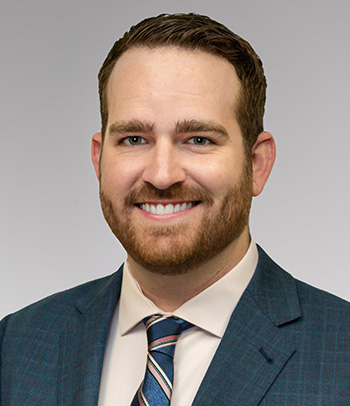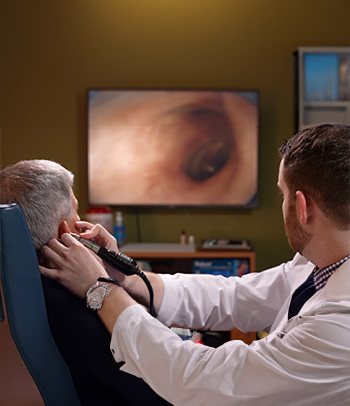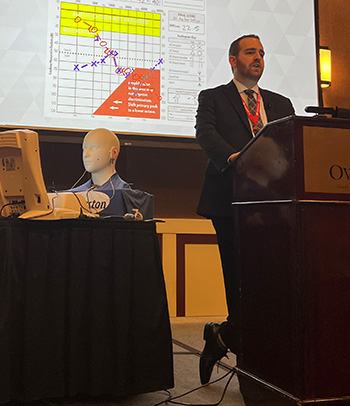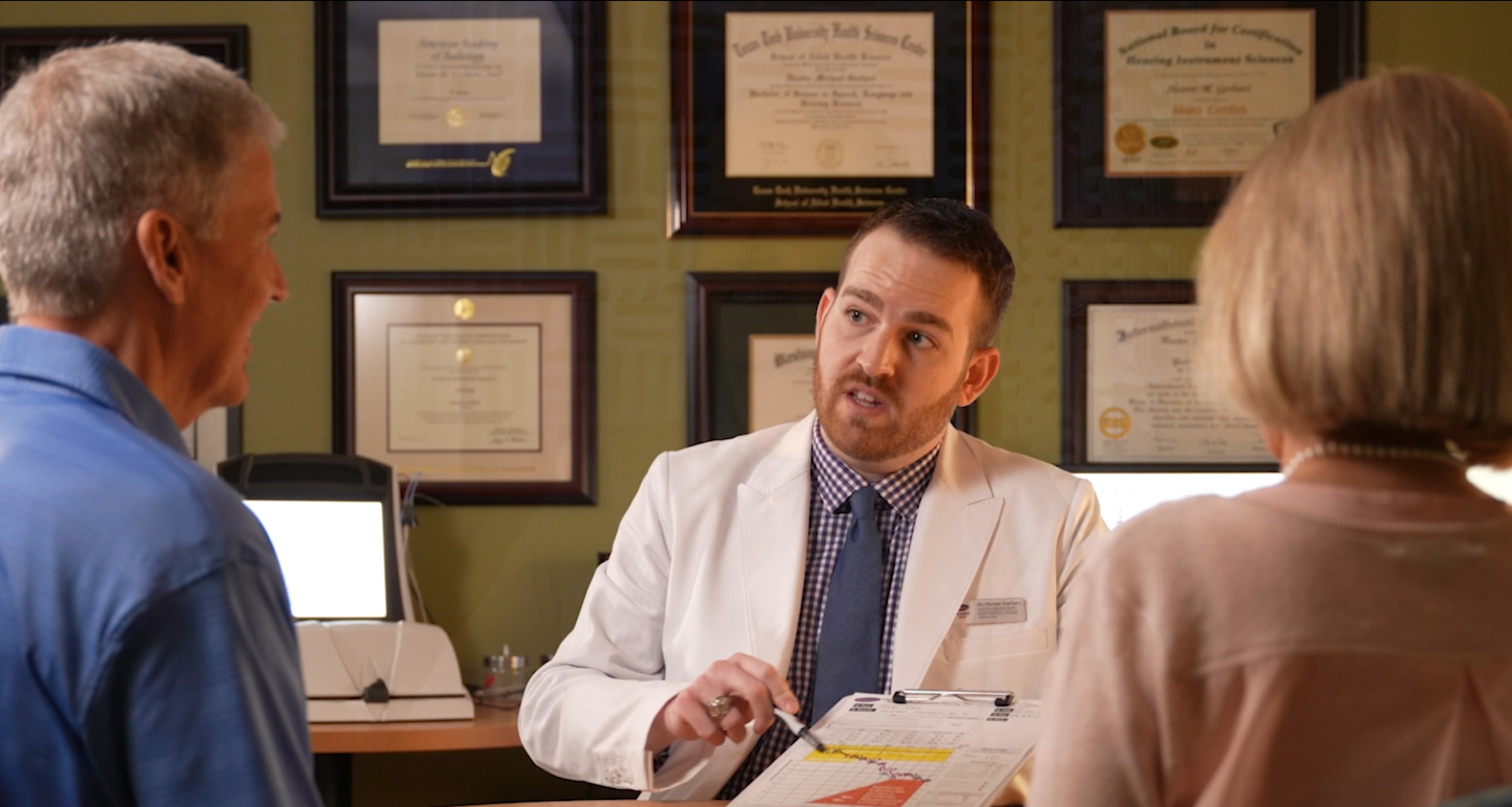“It is a huge privilege to serve Veterans and expand access to communities where this type of care would not otherwise be available.” – Dr. Hunter Gerhart
According to the Department of Veterans Affairs (VA), hearing problems are by far the most prevalent service-connected disability among Veterans. These hearing problems range from tinnitus (ringing in the ears) and hearing loss to decreased sound tolerance and auditory processing problems. Exposure to gunfire, explosions and other loud noises can greatly impact a Veteran’s hearing and when left untreated can also affect their quality of life.
Dr. Hunter Gerhart is a board-certified audiologist within VA’s network of community providers. His expertise makes him a resource to help us learn more about the most common hearing conditions affecting Veterans, as well as about audiologists working to provide Veterans with the care, treatments and resources they deserve.
Meet Dr. Hunter Gerhart
Dr. Gerhart began his career in audiology more than a decade ago. His journey to audiology began in a personal way.
“My passion for audiology began after witnessing the challenges my grandparents faced due to their untreated hearing loss,” he shared. “It’s difficult to watch a loved one negatively affected by hearing loss and change how they interact with others.”
After his grandparents were fitted with hearing aids, Dr. Gerhart was inspired by the transformation in their lives.
“Once again they could engage in phone conversations and enjoy social gatherings. The positive change inspired me to pursue a career in audiology,” Dr. Gerhart said.
Then a student at Texas Tech University, Dr. Gerhart switched his major to focus on becoming an audiologist. Now, as Director of Audiology for a multi-state provider group, he manages operations across several office locations, working closely with each office to support patients along their hearing health journey.
It’s easy to hear the passion Dr. Gerhart has for his work.
“Our purpose is to enrich lives through better hearing,” he shared. “It’s rewarding to witness how hearing aids improve people’s quality of life and strengthen their relationships with loved ones.”
Common Hearing Conditions Among Veterans
Dr. Gerhart sees many Veterans in his practice and says that tinnitus is the most common service-related injury.
“Veterans experience higher rates of tinnitus due to their exposure to loud noise in environments such as combat zones and around machinery,” he said.
Statistics support Dr. Gerhart’s experience. Hearing loss and hearing-related conditions are prevalent medical issues for Veterans, according to the Hearing Health Foundation.
Here are some of the most common hearing problems diagnosed in Veterans:
- Tinnitus – This is typically described as ringing in the ears, but it can also sound like clicking, hissing, high-pitched whistling or buzzing when no external sound is present. It can come and go and may be in one or both ears.
- Hearing loss – This can be mild or severe and depends on the type of damage to the ear. It may cause you to have a hard time coping with loud noises or it may make it hard to distinguish what people are saying.
- Decreased sound tolerance – This is more likely after you’ve been exposed to blasts, gunfire and other loud explosions. It causes you to have a negative reaction to everyday sounds, such as being overwhelmed by background noise in a public place.
- Auditory processing problems – This difficulty occurs when you are unable to separate individual voices in a noisy environment, making it hard to understand people trying to speak to you.
Dr. Gerhart points out that while hearing loss and tinnitus cannot be cured fully, they can be treated.
“It’s important to address untreated hearing loss or tinnitus to prevent further damage and improve the overall health and well-being of an individual,” he explained.
Veterans who are concerned about blast exposure, hearing loss or other hearing-related conditions should first talk to their primary health care provider. A referral to an audiologist could be the first step in improving your quality of life.
A Trip to the Audiologist
When Veterans visit an audiologist, Dr. Gerhart explains that the audiologist conducts a comprehensive hearing evaluation to help them understand their unique hearing needs. Based on the results, audiologists are able to find the right hearing device option and customize it specifically for the individual.
“By consulting with an audiologist, patients receive expert guidance and personalized care,” he said.
Treatment Options
There is a wide range of treatments designed to help Veterans manage or reduce hearing loss, enhance their quality of life and reduce the strain that hearing problems can have on their mental health and wellness. Through comprehensive assessments, innovative rehabilitation programs and advanced technology, audiologists can get Veterans the care they deserve.
Hearing aids – According to Dr. Gerhart, hearing aids are one of the most common treatments for hearing loss. Hearing aids are small electronic devices that help to amplify sounds. Hearing aids come in a variety of styles, such as behind-the-ear, in-the-ear and completely-in-the-canal.
“Audiologists are experts in hearing and balance and can help determine the right type of technology fitted for the individual,” he explained.
Cochlear and other auditory implants – If hearing aids aren’t the appropriate solution for an individual’s specific hearing loss, Dr. Gerhart notes that audiologists can determine whether a medical or surgical intervention is necessary.
Coping and management strategies – VA and its community providers like Dr. Gerhart can also help determine additional strategies to help Veterans cope with hearing problems. For example, while there is no cure for tinnitus, there are ways to make the sounds less noticeable and increase a Veteran’s ability to manage by using cognitive behavior therapy, group education and more.
Assistive devices – Veterans can discuss the use of assistive listening devices to help manage their hearing loss, including TV and telephone amplifiers that may increase their quality of life.
According to VA’s news site, Veterans enrolled in VA’s health care are eligible for audiology diagnostic evaluations. If you were exposed to harmful noise during your military Service, talk to your VA health care system provider so you can get started on a treatment plan that works best for you.
An Audiologist’s Mission
For Dr. Gerhart and his team, providing Veterans with access to quality care is an important part of what they do every day.
“I closely collaborate with the VA to ensure care is provided to our nation’s heroes,” Dr. Gerhart said. “It is a privilege to serve Veterans.”
Veterans, you deserve to feel your best. If you’re experiencing hearing loss or another hearing-related health issue, reach out to your health care provider so you can get the care you need.
Editor’s Note – Thank you to Livingston Hearing Aid Center for participating in this article, as just one of TriWest’s thousands of network providers caring for Veterans. If you are a network provider caring for Veterans, with a story about Veteran care to share, please email us at Media@TriWest.com.







